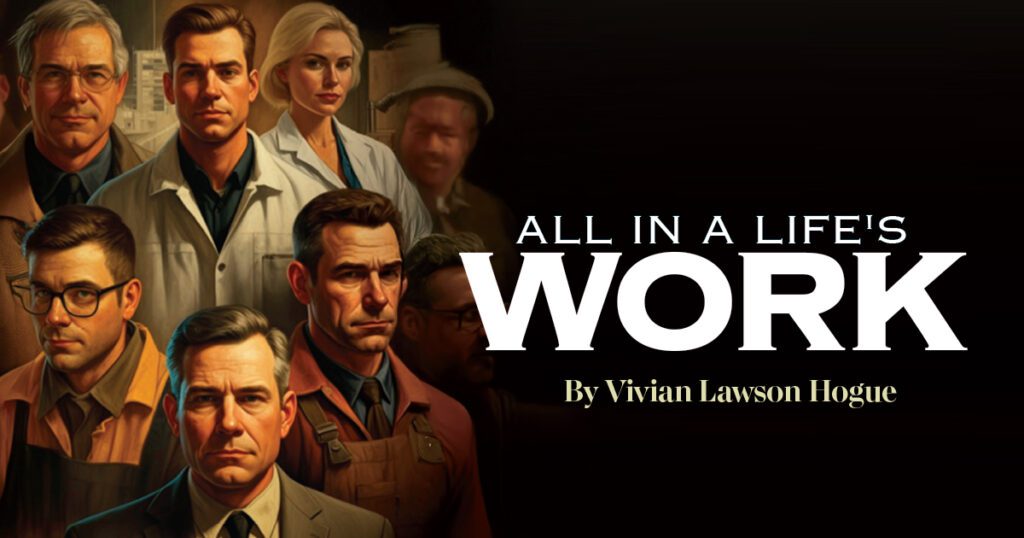08 Sep 2024 All in a life’s work
By Vivian Lawson Hogue
I recall when I was very young that people might ask if my mother worked, and I said, “no.” With five children, I know she would have disagreed. Our dad was on work trips much of the time, so she was the cook, clean-up crew, sore throat swabber, canning expert, family accountant, school activity attendee and clothing manufacturer.

Plenty of mothers did work at the shoe factory or served as teachers, nurses, secretaries, maids, store clerks, seamstresses, cooks, hairdressers or ironers. Grannies and aunts cared for their children if needed. A couple of ladies owned women’s stores, and for our post-war town, some ladies, especially war widows, ran apartments with room and board. It was a long time before I found out that “board” referred to a dining table.
Many men owned small or large businesses. Cotton farms and related services reigned, but many professions comprised attorneys, physicians, college professors, carpenters, plumbers and preachers. Other businesses were dairies, furniture stores, service stations, cafés, clothing stores, barbershops, as well as those selling hardware and shoes. Anywhere from five to seven men were policemen!
Downtown, or “uptown” depending on the location of your residence, was a fascinating place to get some people watching in, as the businessmen sported suits, hats and sometimes canes, while the middle-class women wore “house dresses” and the upper echelon often wore nice dresses, hats and gloves. If you were headed for one of the two theaters, wearing apparel styles and conditions didn’t matter as no one would see you.
Sometimes work can be play! My youngest brother, Noel, once worked very hard at building a store in our backyard. Central College for Women (later Central Baptist College) had closed in 1951, and Westmoreland Furniture located a store on the first floor of Old Main. Much of its stock arrived in wood boxes or wood framing. After shipment items were removed, this lumber was tossed into a pile out back. Noel discovered it one day as he rode past on his bicycle. I did not ask what he was doing, nor did our mother, but I knew something was up. For days, he went to the trash pile and brought lumber home on his bike, one hand on a bike handle and one loaded with his future “store.”
Hammers, nails and cardboard boxes kept him busy for days. He didn’t want my interference until he realized that I could be useful to travel the alley behind us and survey people’s trash looking for “stock” for his store. This included empty cracker and oatmeal cereal boxes, discarded canned vegetable cans and tiny jars that once held pimiento cheese. Most women actually kept those, though, as their manufacturer-intended use was for juice glasses. My most significant finds were a bottle of corn syrup and a blue bottle of cheap Evening in Paris perfume. Empty glass milk bottles were never found, as residents put those on the back steps to be replaced with full bottles by the milkman.
He never had any customers, but many admired his work. Therefore, he finally declared bankruptcy. As his marketing manager, I would have suggested facing the storefront to the street. He kept the lumber for a few years, then used it later when he built a many-many-feet-high tower on top of our storeroom. It was covered with a smelly, heavy fabric tarp that reeked of car engine oil. This was his getaway so he could do things like smoke newspaper cigarettes filled with corn silks from dad’s garden. He did talk me into trying one. Once. Scorched newspaper and corn silks get very, very hot when introduced to the tongue.
As a 5-year-old, even I worked inside, but preferably outside. After an hour or so of climbing the-now-former mimosa tree and hanging upside down by my knees on the limbs, I might decide it was time to “eat.” I concocted my own artisan bread recipe using mud and mimosa seeds extracted from the tree’s seed pods. I kneaded the “dough” until smooth, added the seeds, kneaded some more, rolled it out on a brick with the sides of a Mason jar and baked it in the sun for three days at 102 degrees. My day’s work was done.
For the most part, the different “classes” of local people worked, some harder than others, but that was just life since time began. If you wanted to live under a good roof, pay your bills, tithe what you could at church, have food to eat and clothes to wear, you worked. I’m always hard on Adam, but when he broke the law in paradise, his Father said, “Son, you had it all for free and you broke the house rules, so from now on, you and everyone else will have to work. And Eve? You will deliver your children in pain.”
Well, something like that. I wasn’t there. But I would like to speak with Eve in private.
- They found their ‘true grit’ - January 5, 2026
- And that’s what Christmas is really all about - December 2, 2025
- Giving thanks - November 4, 2025









